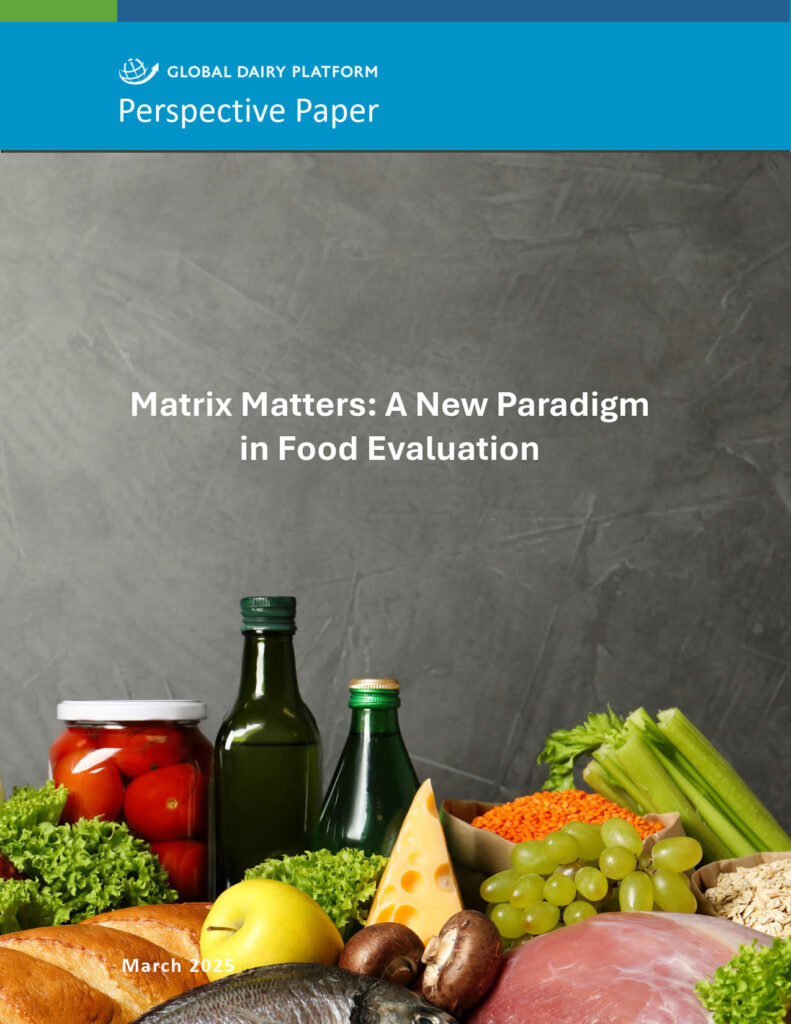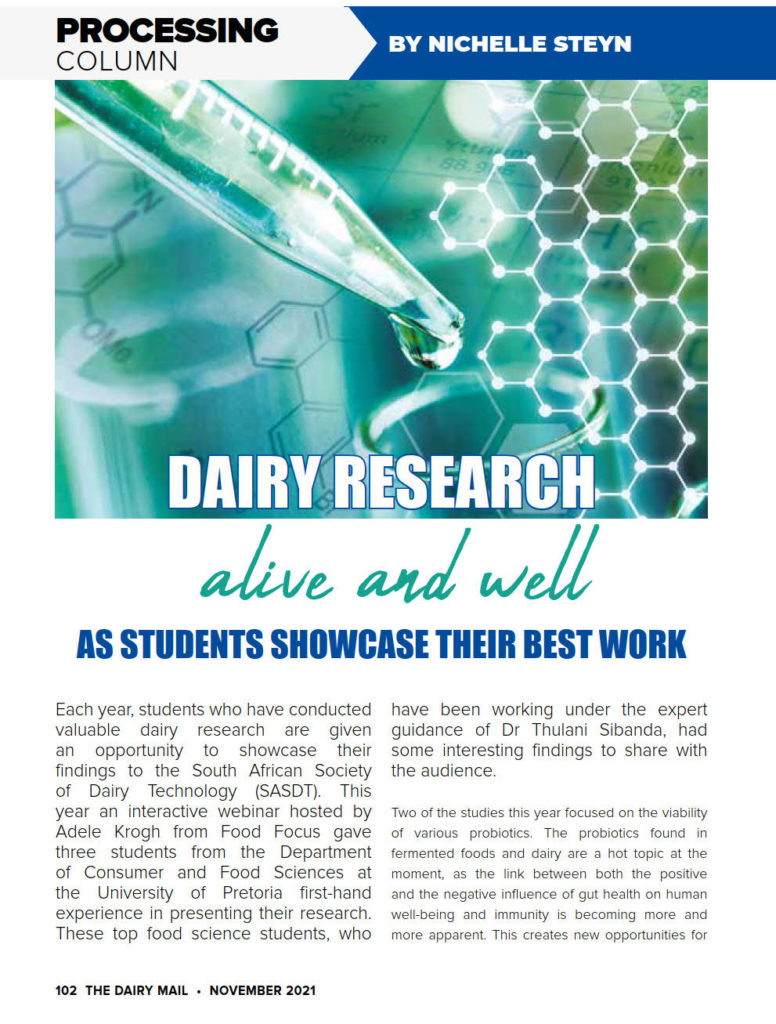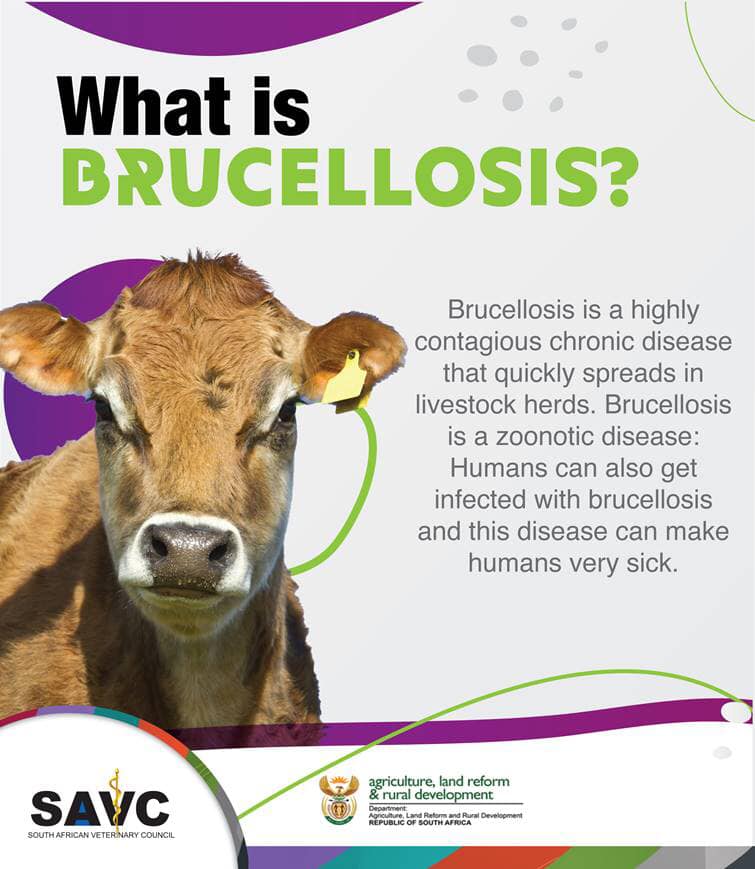Matrix Matters: A New Paradigm in Food Evaluation

Dairy Research Alive & Well As Students Showcase Their Best Work
Dairy Research Alive & Well As Students Showcase Their Best Work

Dairy Research Alive & Well As Students Showcase Their Best Work
Consumers Ready To Buy What Dairy Has To Offer

Consumers Ready To Buy What Dairy Has To Offer
The wonderful world of dairy proteins

The wonderful world of dairy proteins
Are You A Member of the South African Society of Dairy Technology?

Are You A Member of the South African Society of Dairy Technology? In the May edition of the Diary Mail, our current SASDT president Christine Leighton published an article on the role the SASDT plays in the dairy industry in South Africa. Click Here To Read The Article
Brucellosis Awareness Months

Brucellosis Awareness Months November and December are Brucellosis awareness months and the SAVC, in partnership with the Department of Agriculture, Land Reform and Rural Development (DALRRD) and the National Animal Health Forum launched a Bovine Brucellosis awareness campaign. With the purpose of the campaign, to create awareness about Brucellosis and educate all stakeholders (Veterinarians, Para-veterinary professionals, farmers, and the general public) about the dangers of this zoonotic herd disease. What is brucellosis? Brucellosis is a controlled animal disease under the Animal Diseases Act, 1984 (Act No. 35 of 1984), and the regulations prescribe that “all heifers between the ages of 4 and 8 months in the Republic shall be immunised/vaccinated once with an efficient remedy by the responsible person”. There are currently two registered vaccines in the country, and we encourage livestock owners to only use registered vaccines. Bovine brucellosis is a chronic herd disease, caused by the bacteria Brucella abortus, which may cause abortions in pregnant cattle and a drop in milk production. It also causes decreases in production and reproduction rates, which lead to financial loss to affected livestock owners. There is no treatment for infected cattle. Bovine brucellosis is endemic in cattle in all nine provinces of the country, is ongoing and requires concerted effort and intervention. From 2015-2019, over a thousand new herd units were reported countrywide to the DALRRD as bovine brucellosis positive. This is unfortunately still an underestimation of the true number of herds infected, due to challenges with the testing of all cattle herds and effective reporting of positive herds to a central level. Brucellosis is zoonotic disease which can be transmitted to humans, mainly through the consumption of unpasteurised dairy products from infected cows and through handling of birth materials, aborted foetuses and new born calves from infected cows. Humans show non-specific flu-like symptoms, recurrent fever, body aches and pains, headaches and depression. The disease in humans can become chronic if medical treatment is not obtained. The (Animal Diseases) Act places the responsibility on the owner of animals to prevent disease in their herds, treat any disease present and to prevent spread to other herds; it is for this reason we encourage cattle owners in all nine provinces of the country to vaccinate heifer calves between 4-8 months of age, to determine the brucellosis status of their herds through testing, and to only buy in cattle from herds with a known disease status. The South African Veterinary Strategy (2016-2026) has identified bovine brucellosis as a model disease for disease control purposes and this strategy has the backing and support of the entire veterinary profession. The “Bovine Brucellosis Control Policy, South Africa” has been finalised and the document is available here. The policy has identified seven objectives, each of which requires the development of detailed implementation plans. The same central policy is to be applied across all provinces to ensure a consistent and effective approach to disease control. Vaccination of all heifer calves between 4 and 8 months to obtain improved countrywide herd immunity. Education and awareness targeting relevant role-players (farmers, industry, veterinary services, etc.). Testing of cattle herds to determine their brucellosis status. Movement control of infected cattle to prevent brucellosis spreading to other herds. Slaughter of brucellosis positive cattle to remove the source of infection within the affected herd. Reporting of brucellosis information to a central database for trend analysis. Effective implementation of control measures to safeguard animal and human health. Having decided to recognise November as a national brucellosis awareness month, the South African Veterinary Council, in partnership with the South African Veterinary Association, the National Animal Health Forum, the Department of Agriculture, Land Reform and Rural Development and all their associated partners, have embarked on an extensive awareness and education campaign, which will continue into December, regarding bovine brucellosis. The control of bovine brucellosis is not the responsibility of a single entity – it requires collective control and, all stakeholders need to work together and play their part to control the disease and prevent even more herds and potentially people from becoming infected. For more information visit: https://nahf.co.za/minister-didiza-announces-the-outbreak-of-brucellosis-in-kwazulu-natal/
